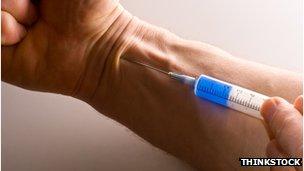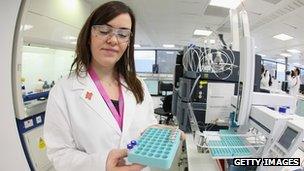Testing times: Injecting reality into the war on doping
- Published

Athletes now need serious medical back-up to stay ahead of the testing agencies
The London Olympics will see the greatest effort yet to stamp out the curse of chemical cheating. But with rising costs, some question whether sport can keep up the fight - so is it time to redefine what is meant by doping and performance enhancement?
Once a day, every day, a former European athlete is reminded of his greatest victories - but not because of his trophies and medals.
To stay alive, this one-time champion has to inject himself with the medical substance on which his fame largely rests.
According to anti-doping scientists who have heard this story, this unnamed athlete is believed to have taken so much of the blood-boosting drug erythropoeitin (EPO) during his career that his body permanently lost the ability to make red blood cells without it. He will need to inject the drug for the rest of his life.
Cases like this are rare. But they illustrate the price some athletes are sometimes willing to pay for a shot at glory.
Thomas Chamney is an Irish middle distance runner who competed at the Beijing games in 2008 but will miss London through injury. He is vehemently opposed to doping in sport but he understands what drives some athletes to cheat.
"There's a lot of money to be made - sport is business, people will try and find a way of breaking the rules and getting away with it," he says.
Chamney believes that global anti-doping efforts have had an impact. Nowadays if you want to cheat, you need to be very organised.
"In order to stay ahead of the testers you do need serious medical back-up - you need professionals who are experts in your endocrine system, the latest versions of EPO - if you're just some guy buying it off the internet you're going to get caught. If you don't have access to those types of resources you're going to go down pretty quick."
Sporting cockroaches
Many experts see this type of systematic doping as the biggest threat to sport. And they believe that London's record-breaking number of drug tests and the showpiece <link> <caption>laboratory</caption> <url href="http://www.bbc.co.uk/news/science-environment-16630588" platform="highweb"/> </link> paid for by pharmaceutical giant Glaxo SmithKline may not be the most effective way of dealing with this threat.
Dr Margaret Goodman is the founder and head of <link> <caption> VADA</caption> <url href="http://www.vada-testing.org/" platform="highweb"/> </link> , the US based voluntary anti-doping association, which mainly tests boxers and martial arts fighters.

Doping can rapidly increase the number of red blood cells to boost endurance
"The athletes that they are catching...like, you know, how if you find a cockroach in your apartment there are probably a thousand behind the cupboard you are not seeing and it's the same with this," she explains.
"There are so many athletes using substances or methods who are not being caught because of the process and the way they are being tested."
The view that sport is over-reliant on big event testing is shared by David Howman the director general of the <link> <caption>World Anti-Doping Agency</caption> <url href="http://www.wada-ama.org/" platform="highweb"/> </link> (WADA).
"I'm concerned about the effectiveness of testing. We know there are some sophisticated athletes out there who are getting away with it. We need a greater emphasis on the science, so that we are not to be outdone by technicalities, such as legal challenges," he says.
WADA place great importance on out-of-competition testing and using intelligence to target cheats. They are also long term supporters of the athlete's biological passport. There's good evidence that in cycling and athletics the passport's introduction in the past few years has helped curb the widespread abuse of drugs that can boost endurance.
By comparing an athlete against himself over a long period of time, the passport records small changes in blood and urine profiles that might be indicative of doping.
Passport to nowhere?
Some experts believe that more and better passports are the way forward, saying that steroids and hormones could also be monitored long term. But there are concerns over the huge cost of expanding the programme.
Others are concerned about the philosophical implications of extending these monitoring regimes.

An expensive anti-doping lab handles testing for the London 2012 games
Prof Andy Miah is director of the <link> <caption>Creative Futures Research Centre</caption> <url href="http://www.creativefutur.eu/" platform="highweb"/> </link> at the University of the West of Scotland, and an authority on how emerging technology will affect performance in sport.
"It seems to me that in a very short period of time we will have public biobanks and genomes that can be mapped for $1,000. We will have a world where we take this to its logical extreme, everyone is bio-monitored from birth and anything that changes about their biochemistry in whatever field they are in will be subject to rules of disqualification," he says.
Dr Miah says that physical and performance enhancement, be it chemical or technological, is now widely accepted in society and we should rethink how we define what's banned in sport and what's allowed.
"If there's no health risk, or the risk is low then we should allow athletes to use it, in fact we put athletes in a position where they have to use technology to go beyond their predecessors," he explains.
"Elite sports are about extraordinary performances - if they weren't they'd just be recreational activities."
Back to the future
So what are the types of future doping that the authorities will have to cope with? One area where performance gains may one day be made is in the realm of genetic medicine.
Scientists have already identified the genes responsible for building muscle and increasing red cell production. By using a virus to smuggle in a piece of DNA code into cells, the crucial genes could be turned on and the athlete would gain tremendous advantages in strength or endurance.
But there are a number of drawbacks. There are significant health and safety issues, including a risk of cancer. And WADA has already put a blanket ban on genetic manipulation in place.
A number of experts think that the future of doping is in the past, including Dr Margaret Goodman.
"The designer steroid which was all the rage some time ago is not necessarily what athletes are going to, they're going to more simple, easy methods such as plain old fashioned testosterone," she says.
Doping using your own blood is also an ongoing problem, although it is rumoured that new tests for this old-fashioned method are to be implemented during the London Games.
According to Prof Chris Cooper, the author of Run, Swim, Throw, Cheat, the most likely future doping candidates are the medicines developed to treat sick people, such as EPO and anabolic steroids.
"Every drug ever used to enhance sports performance started off as a pharmaceutical drug designed to help sick people get better. So the next generation of dopers are busy scouring the medical journals for inspiration, rather than the sports fields," he says.
Athlete Thomas Chamney says that rather than weakening the argument for anti-doping in sports, the development of new technologies and medications actually strengthens it.
"As the human race becomes more accepting of technology, you've got to try and keep sport as pure as possible." he says.
"It's about your ability, your talent, your training, your coaches - it shouldn't be about grossly external factors such as what prescription am I on this week. "
- Published12 July 2012
- Published5 June 2012
- Published3 April 2012
- Published17 September 2011